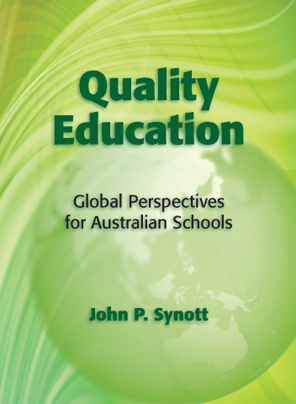The Book
The impacts on knowledge from the social and economic changes brought on by globalisation and the information revolution have been profound. It seems important that those intending to be professional educators, maybe more so than any other profession, need to be well informed about contemporary social issues and the key areas of social concern and change.
This book introduces a range of global perspectives and information into the frameworks of contemporary Australian school education and the professional activities of teachers. It is oriented towards teacher education students, teachers and academics involved in professional development. Its purpose is to introduce to them some of the ways schools, the people in them, and the knowledge that is their business are being transformed as a consequence of globalisation. It attempts to bring into the frameworks of Australian education the implications of new developments in education from global and comparative perspectives. It sets out to inform and challenge teachers’ pedagogy, their conceptions of schooling and their engagements with students. It proposes constructive approaches to the ways teachers can build their capacities as educators for the global society. Success will lie in the abilities of well-informed teachers to innovate in their classrooms and respond creatively to the challenges being presented to them. The contents in this book invite Australian educators to develop approaches and skills appropriate for the education of their students as global citizens in a rapidly changing world.
The Author
John P. Synott, Ph.D, is an internationally eminent teacher and scholar in peace and development education, the sociology of globalisation and Korean studies. He has researched and taught in many countries. He has published extensively, most recently with the book Global and International Studies: An Introduction (2009). He is concerned to apply the knowledge of peace and development education into mainstream educational policy, curriculum and teaching practice as part of education for global citizenship. He was inaugural editor of the Journal of Peace Education and is a co-editor of Social Alternatives where he is also poetry editor. After a long career as a faculty member of the School of Humanities at Queensland University of Technology, John Synott now practises as a consultant and freelance author. He is Secretary-General of the Asia-Pacific Peace Research Association.
Contents
1 Quality Teaching in a Globalising World
Globalisation and Social Change
Educational Impacts of Social Change
Quality Teaching at the Centre of New Educational Policies
The Social Contexts of Quality Teaching
2 School Institutions, Learning Sites and Teachers’ Careers
Overview
School Settings – Past and Present
Schooling in Australia
Understanding the School Systems in Australia
Schooling Structures in Australia
Global Impacts on School Institutions in Australia
Schools and Nation-Building
Key Competencies: The International Framework
Australian Education in World Context
Formal and Informal Education
Teachers and Teaching Careers
Reviews of Teacher Training
Performance-based Pay: a Current Issue for Teachers
Teachers’ Careers
Knowledge and Professional Development
New Directions for Schools
Teacher Unions
Schools, Social Change and Education in the Future Society
Conclusion
3 Knowledge and Communication
Introduction
Teaching and Learning Traditions Across Cultures
The Traditions of Teaching and Knowledge in the West
Knowledge and Teaching in the English Tradition
Education in the Industrial Revolution
The Industrialisation of Teaching
Education after the Industrial Revolution
The Contemporary Contexts: The Third Industrial Revolution
Global Inequality and the Third Industrial Revolution
From Information Revolution to Knowledge Societies
Calls for New Knowledge Perspectives
Knowledge Societies
Teaching and Learning in Knowledge Societies
Transforming Professional Teacher Education
Classroom Practice and Content
Impacts of New Technology on Social Behaviour in Schools
Conclusion
4 Security for Students, Teachers and Schools
A Short History of Violence in Schools
School Children as Participants in Violence
The New Security Contexts of Schools
The Safe School Initiative Report in the US
School Measures to Prevent Extreme Violence
Teacher Responses to School Violence
New Forms of School Violence
Developing Conflict Resolution Skills
Students as Peer Mediators
Children from Sites of Conflict and Crises
Gender-Based Violence
Peace and the Curriculum
The Vital Role of Language
Building Peaceful Communities through Nonviolent Schools
5 The Cultural Fields in Contemporary Education
Overview
Globalisation and Cultures
Cultures and Conflicts
Recent Cultural Conflicts and Issues in Australia
Positive Responses to Cultural Diversity
Cultural Policies in Education
Government Approaches to Cultural Diversity in Australia
Development of Multicultural Education Policies in Australia
The Formal Curriculum and Intercultural Learning
Diversity in Language Education
International Encounters for Learning
Informal Curriculum for International Education
Teachers for Cultural Diversity
Conclusion: Teaching and Cultural Awareness
6 Education for Human Development and Sustainable Environments
Teaching for Contrary Trends
Youth and Education in Today’s World
The Importance of Education for Human Development
United Nations Instruments with Educational Aspects
Priority: Entrepreneurial Education
Aspects of Entrepreneurship Education
Comparative Models of Entrepreneurship Education
Education for Environmental Sustainability
Teaching for a Sustainable World
Convergence of Entrepreneurial, Human Development and Sustainable Education Perspectives
7 Teachers, Students and Identities
Identity Concerns at Forefront of Educational Research
Coping With Stress
Approaches to Stress Management
Composing Identities
Student Roles in Societies
Contemporary Challenges to Personal Identity
Nationalism, Identity and Schools
The Challenges of Globalisation to National Identities
Strengthening Identity through a National Curriculum
National Policy for Indigenous Education
Sexuality and Identity
Gender Aspects of Identities in Schools
Education and Consumer Cultures
The Commercialisation of Schooling
The Social Identity of Teachers
Teacher Identity as a Function of the Market
Teachers as Sources of Knowledge
Teachers as Guardians of Student Security
Teachers as Vocational Trainers
References
Index |
